#communication tips
Text
Something that was crucial to me being able to foster healthy relationships (platonic and romantic) was learning those around me aren’t mind readers.
Communicating honestly and effectively can allow people to be there for you. It can also allow you to work out conflicts in order to maintain long term relationships.
It might seem “wrong” to ask for your needs to be met. But it isn’t. In fact, usually our loved ones prefer us to be up front with our needs rather than hinting at them. (Hinting is exhausting for both parties and easily missed.)
Communicate your boundaries. “When you tease me about —-, it really upsets me. Please don’t do that anymore.”
Communicate what is working for you. “When you reach out to check in when I’m having a hard time, it really helps and makes me feel supported.”
Communicate what you need. “Things are really hard right now. I could use the company of a friend. Can I call you?”
A lack of communication can lead to relationships breaking. Resentment builds. Misunderstandings happen. Feelings get hurt.
If you don’t tell your loved ones what you need, then it’s unfair to us and them to be upset at them for not reading your mind.
You are allowed to have needs and wants. And you are allowed to express them.
5K notes
·
View notes
Text
tone of voice really plays a massive role in conversation. a lot of the time when my friends tell me about their arguments, they focus on what they said and say that they don’t understand why the other person blew it out of proportion. maybe it’s not what you said but how you said it. next time you get into a misunderstanding with someone, pay attention to your pitch, your volume, your pace, etc. it could be a total game changer for you and the relationships that are important to you!! ❣️
#advice#self care#gentle reminder#self improvement#self help#note to self#communication tips#personal growth#positive energy#positive thinking#positivity#positive mindset#positive suggestions#these belong to honeyy
173 notes
·
View notes
Text
Self Diagnosed Autism Entry 12
The previous entry wasn’t really self-dx related so count this as that!
My partner and I have a lot of petty arguments full of misunderstandings and frustrations. It usually ends with me in full meltdown but never ends the relationship. Time and time again it has shown me that it’s because we are not fully understanding each other.
My partner when stressed has mental processing issues making it hard for him to understand. Where I feel I over explain in a hamster wheel to my doom.
So we started making cue cards today! Today we worked on conflict resolution, active listening, opened ended questions. Next we will go through:
Meltdown protocols
Feeling cards
Laminated feeling wheel spectrum
Mad libs for details on situations (planned events, schedule related things) because I need ALL the details that way I can write it down like knowing how many people, where, time duration, etc.
I have them color coded together.
Green is conflict resolution
Circles are empathetic
Triangles are supporting
Squares are understanding
Stars are alone “trump” cards
I think this could help some people like us

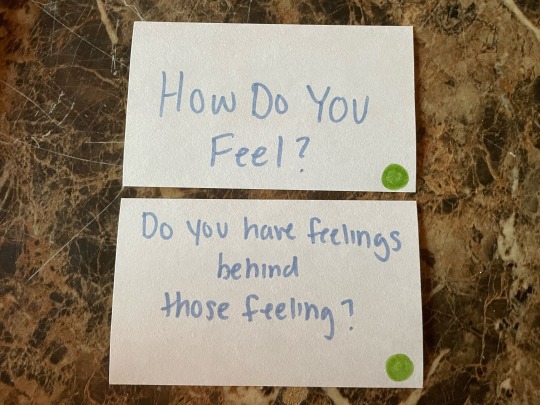

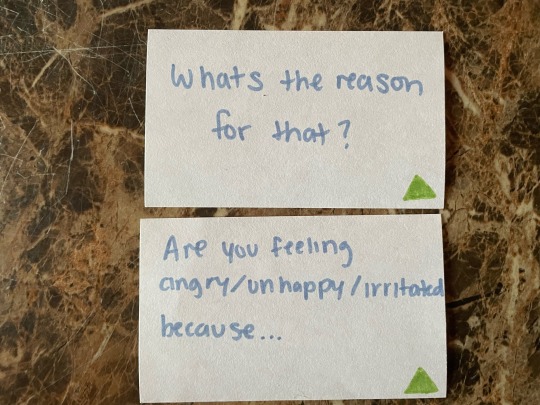
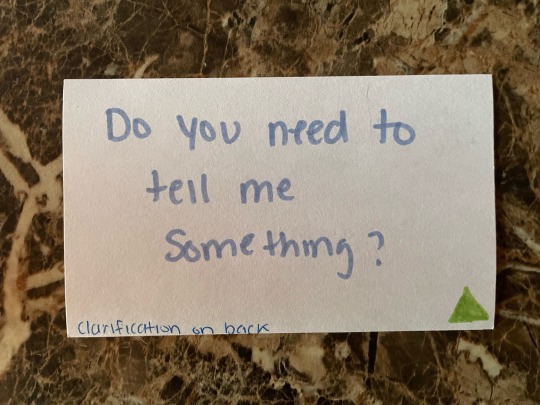
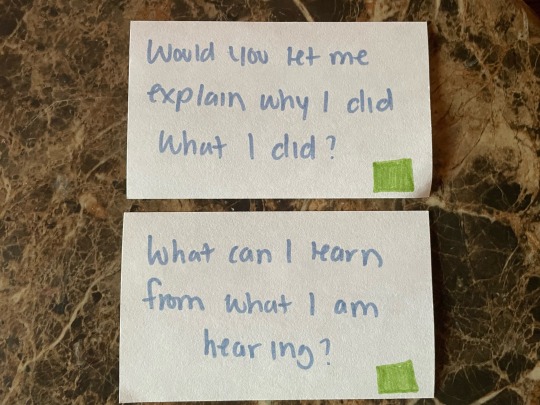
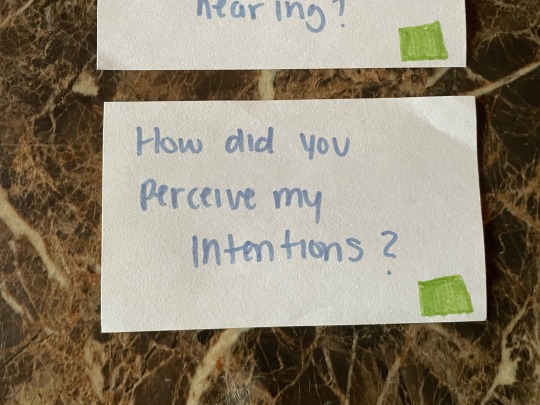

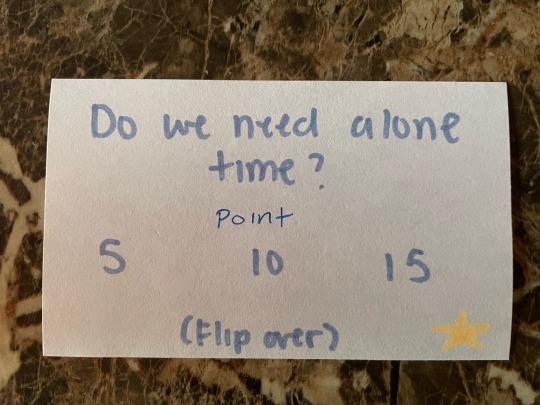
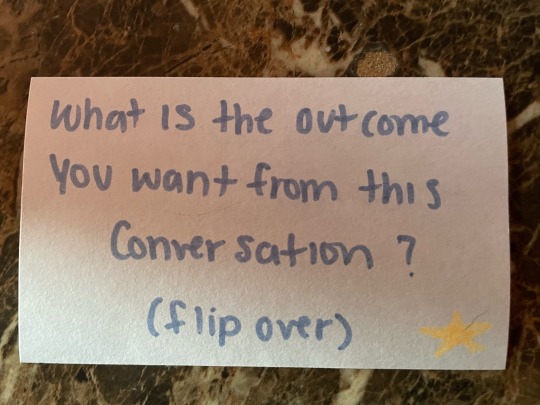
The alone time backside has signs of a meltdown
The outcomes of conversation has: to be understood, to explain, for an apology
I feel that this will strengthen our relationship and friendship to better understand each other. I love him for wanting to learn with me.
#actually autistic#self diagnosed autisic#autisic traits#late diagnosed autistic#autistic feels#autism#communication#alternate communication#communication tips#autistic relationship#autistic experiences#meltdowns#shutdowns#selective mutism#unmasking autism#neurodivergent#executive dysfunction#autistic adult#actuallyautistic#autistic spectrum
39 notes
·
View notes
Text
Creative tricks through articulation: How you can influence the psychology of the interviewer
Discover tips for better communication! From word choice to tone - make conversation your tool. 🔊🗨️ #Communication #Tips #tricks #ArtOfConversation #Community #articulation #application #interview
The way you express yourself – your choice of words, your tone, and your articulation – can have a significant impact on how you are perceived. Here are some tips and tricks you can apply to positively influence the psychology of the person you’re speaking to:
Use positive reinforcement
If you repeat positive terms or phrases used by an interviewer, you not only build a stronger connection with…

View On WordPress
#Abgleich#Application Processes#Application Tips#Art of conversation#Artikulation#Beispiel#Beispiele#Beitrag#Bestätigung#Bewerbern#Bewerbung#Bewerbungsgespräch#Blog#Career Strategies#Choice of words#Communication tips#Dialog#Effective communication#Effective Self-presentation#Emotionaler Bezug#Empathie#Erfolg#Expressing yourself#Impactful articulation#Interview#Job Interview#Karriere#Möglichkeiten#Offenheit#Perception and influence
2 notes
·
View notes
Text
How to develop communication skills in English
Practice with the “intensive reading” technique

“Intensive reading is reading with concentration to understand exactly what you are reading.
This is the opposite of skimming, which means reading to understand the content in general, this reading helps the reader feel confident and interested in the reading process because it is possible to visualize what is being read. No need to focus too much on details. While skimming can be helpful in many ways, thorough reading is more helpful in helping you quickly improve your English skills.
The careful reading technique includes the following steps:
Identify important words
Cover some words and guess their meanings
Write a summary after reading
Read with an English tutor (or a friend) or discuss the content of the text you have read.
Make sure you choose short reading passages when practicing your intensive reading technique, or you will get overwhelmed and quickly give up on the practice.
This “intensive reading” technique not only helps you understand the meaning of the text deeply, but it also helps you accumulate ideas from the text so that when communicating, your brain will also quickly turn what you read into the content. Use the conversation naturally.
Practice speaking in front of the mirror
Practicing speaking in front of a mirror can help you feel less shy when speaking in English. Sometimes, communicating in English while your current level is still low can make you feel awkward and awkward. This is partly because you don’t know what your mouth looks like when speaking sounds that are not in your mother tongue, even if you are pronouncing them correctly.
So watch how your mouth moves when you speak English in front of the mirror. Better yet, compare your pronunciation with native English speakers. For example, you might repeat some dialogue from a TV show and try to imitate the actor’s mouth movements. This will not only help you build confidence but also help you improve your English pronunciation.
Learning with a “distributed practice method”
The “distributed practice” method ensures that you will always improve your English and achieve lasting achievement. In this method, you will have many very short study sessions.
This is different from many other training methods such as cramming, studying too much, or just starting to study right before a test. Aside from actually making you feel uncomfortable, cramming doesn’t help you remember information for a long time. Most people forget everything they have learned as soon as they finish their test.
To start using distributed practice, create a study schedule. Try to study at least a few times a week and plan out what you want to learn each day/week/month/etc. Set multiple goals for the English skills you want to improve to better track your progress.
Mark strange words while reading
When reading an English book, mark the words you don’t know and don’t look up the dictionary until the end of the chapter. Then, turn these unfamiliar words into a list of words to learn for the day.
This is a good test to improve learners’ English vocabulary and reading comprehension. You just pick out a book that looks interesting and sit down with a pen and notebook. By the end of that chapter, you should have at least a few words to look up.
Repeat English puns (“tongue twisters”)
“Tongue twisters” are short English sentences that are repeated over and over with a lot of similar sounds, making them very difficult to say even for native English speakers. In Vietnam, there are also many such sentence patterns, such as “a copper pot cooks snails, an earthen pot cooks frogs”, “eat sour grapefruit for lunch”, etc.
These sentences are very effective in creating fun and helping to improve actual English pronunciation. They will help you master difficult English sounds and use them more naturally. Start slow to make sure you pronounce each word correctly, then try to speak faster and faster!
Record your English pronunciation every day

This may sound tedious (because it’s boring and repetitive) but then you’ll be so happy you decided to do this. Use the voice recorder app to make a recording of your English speech every day. You can simply talk about a day that has passed for a few minutes, read a passage from an English book or newspaper, say some new English words that you have learned, or anything that suits you. friend!
But don’t stop there. After the recordings, you need to listen to them again and try to catch your mistakes, whether it’s pronunciation mistakes, grammar mistakes or misused words, etc. This is one of the most practical and immediate ways to improve your English, especially if you are learning a foreign language on your own. If you don’t correct your mistakes, you will continue to make mistakes and your English will improve more slowly.
An added bonus is that these recordings can be a great motivator in your later learning. Because it is certain that there will be times when you will have difficulty, you are not as fast as you used to be, and complex English grammar concepts seem too difficult. You may even want to give up. At this point, the recordings will remind you of how far you have come during your studies, which can lift you up when you feel demoralized!
Memorize common homonyms
Homonyms are words that have the same pronunciation but different (and possibly different spelling) meanings. Some examples of English homonyms include:
Blew – blue (blow – blue)
Know – no (know – no)
Here – hear
Studying homonyms will help improve your English conversation skills and avoid confusion between words. You will hear English more easily if you are familiar with the same common words. To memorize common homonyms, you can use flashcards for word pairs with actual meanings.
2 notes
·
View notes
Text
How To Improve Your Communication Instantly

Most of the lesbian couples that reach out to do couples counseling with me say that one of their biggest relationship issues is COMMUNICATION.
Can you relate?
If so, you’re definitely not alone. It’s supper common for couples (yes, even lesbian couples) to struggle with communication.
THERE ARE A COUPLE OF TYPICAL WAYS THAT THESE PESKY COMMUNICATION PROBLEMS SHOW UP
Do you and your partner go round and round about the same topics and never get anywhere new?
Do you end up frustrated or angry, feeling like she doesn’t listen or really hear what you’re saying?
Afterward, do you ever want to crawl in a hole because you said some mean or hurtful things to the woman you love? Feeling sad that you can’t hit a rewind button and change what you said.
Or would you say more of your issues result from the communication affliction of avoidance?
You know, where you work hard to avoid having difficult discussions, because you don’t want to end up fighting. So you never (or at least rarely) speak your most vulnerable truth.
Whether you’re fighting too often or not speaking up enough, my bet is (like the couples I see in couples therapy) you can improve your communication game. And become a much better team.
7 SIMPLE HABITS THAT WILL IMPROVE YOUR COMMUNICATION INSTANTLY (AND THEY HAVE NOTHING TO DO WITH HOW YOU TALK OR LISTEN)
Chances are, most of the things you’ve heard or read about how to improve your communication are technical suggestions on how to speak differently or listen differently.
Well, you’ll be glad to know that I’m not going to bore you with more tips on how to use “I statements” or how to “parrot back” to your partner what you’ve just heard her say.
In my world, those tips are tired. AND ineffective. Especially if you don’t have some of the foundational pieces in place.
It would be like telling you and your partner to choreograph a seamless dance without knowing what music you’ll be dancing to or where you’ll be dancing. Just wouldn’t work well. Right?
7 NON-VERBAL COMMUNICATION MOVES THAT WILL UP YOUR COMMUNICATION GAME:
1. CHECK THE CLOCK
Maybe that sounds silly. But I’m dead serious.
Think about this…
Have you ever tried to start a difficult conversation at about the time your partner is thinking of heading to bed? Or worse yet, right before your dinner guests are due to arrive?
Needless to say, it doesn’t go so well.
So, make sure you’re mindful of what time it is in relation to other important things going on with you and her.
And never start a hard discussion right before bed. Getting enough quality sleep is an important ingredient to happy relationships.
2. SIT EYE-TO-EYE
What the heck does that mean?
I’ll tell you.
When you sit across from your partner, and close enough to see each other’s eyes (that’s what I call eye-to-eye), you set yourselves up for communication success. And you’ll go from disconnected to connected, fast.
It’s like having music for the dance.
One of my mentors, Dr. Stan Tatkin, explains that love is up close and war is at a distance.
When you gaze into one another’s eyes, you and your partner will have a loving and calming effect on each other.
You’ll be much less likely to trigger a threat response. And you’ll be in a position to read each other’s facial expressions. Which will help with understanding.
BTW — that’s different than reading each other’s minds.
3. SMILE
A genuine smile is a universal signal for friendliness.
It’s a quick way to let your beloved know that you’re on her team. That you’re not out to get her. That you actually like her.
I want you to think back to a time when your partner was super uptight at a social gathering because she felt uncomfortable. And you caught her eye and smiled at her. Remember how she instantly relaxed a bit when you smiled at her?
Smiling at her during a tough conversation will help her relax, too.
And when she’s relaxed she’ll probably do that mirroring thing and smile back at you.
Ahhhh!
Then the tension you’re feeling will ease, in turn.
Smiles create beautiful positive feedback loops. So don’t miss out!
Become the smile leader during your next communication bout, and notice what happens.
4. START CALM AND REMAIN CALM
Whether you’re the one bringing up a topic to talk about, or your partner is asking you to hear her out, be sure to start the conversation from a place of calm.
If you’re agitated and can’t get to calm, let her know you want to postpone the talk until you’re unflustered.
I’m telling you, your communicating will suck if you’re not in the calm emotional range. This range of calm, emotional equilibrium has been referred to as The Window of Tolerance.
I encourage you to work on developing the skills to regulate your emotional and physiological reactions so that you can remain in that zen zone throughout your conversation.
An easy self-calming trick you can start with is to take a slow, deep breath in, followed by a longer exhale. And do that 3 or 4 times in a row. Or 10, if you need to.
5. USE SOOTHING TOUCH
A great way to help your partner and yourself to stay in (or quickly return to) the window of tolerance, is by using gentle non-sexual touch.
You can reach out and take her hand, put your knee against hers, touch her arm, or even reach out for a hug.
A soothing touch will communicate friendliness and love. It will calm tension and remind you both that you’re in this together.
We’re on the same team, here. Not enemies.
Soothing touch goes a long way to set you up for a lovely communication dance.
6. BEWARE OF YOUR THREATENING GESTURES
Sitting eye-to-eye is one of the best ways to minimize threatening gestures. That’s because your brain will automatically respond to movements that you catch in your peripheral vision as more threatening.
But you also need to beware (and mindful) and take responsibility for your facial expressions, gestures, body postures, and tone of voice that your partner might interpret as threatening.
If you trip her threat response wire, the calm and effective communication stint will be over.
So, check yourself on threatening gestures such as:
rolling your eyes
raising your voice
crossing your arms
turning away from her when she’s speaking to you
sighing loudly when you don’t like what you’re hearing
clicking your tongue
checking your phone
flipping her off
7. STAY STEADY
Here’s what I mean by stay steady.
Sometimes it can be terribly challenging to share your vulnerable thoughts, feelings, wants, desires, and concerns with you partner.
Stay steady.
Just go slow and take your time.
As my teachers, Dr. Ellyn Bader and Dr. Peter Pearson have taught me…
Remind yourself: This is an expression of who I am — It’s about me revealing myself and being willing to express my own thoughts and feelings. This process is about my willingness to take a risk to speak or discover my truth, and about increasing my ability to tolerate the expression of our differences.
Another time you’ll need to stay steady is when your partner is sharing with you something that she feels strongly about. Perhaps something that you disagree with.
It might be something she’s upset about. Or even a problem she’s having with you.
Yowza!
Time to stay steady so you can hear her out. It’s up to you to manage your reactions so that you remain curious without getting upset or defensive.
TRY THESE 7 COMMUNICATION TIPS, TODAY
You can set yourself up to have better communication immediately by incorporating these 7 non-verbal communication habits into your interactions right away.
In my next blog, I’ll be sharing a different set of communication skills that will help you have communication success every time you have a conversation with your babe. Stay tuned.
In the meantime, if your relationship is in trouble, and practicing some new communication skills feels like putting a bandaid on a broken leg, then consider coming to a Lesbian Couples Retreat in Denver. Or if you live in or near Denver, call to set up a free consultation for couples counseling. I promise, Lesbian Couples Therapy can help you get back to being happy and secure for good.
3 notes
·
View notes
Text
The symbolism of flowers
Flowers have a long history of symbolism that you can incorporate into your writing to give subtext.
Symbolism varies between cultures and customs, and these particular examples come from Victorian Era Britain. You'll find examples of this symbolism in many well-known novels of the era!
Amaryllis: Pride
Black-eyed Susan: Justice
Bluebell: Humility
Calla Lily: Beauty
Pink Camellia: Longing
Carnations: Female love
Yellow Carnation: Rejection
Clematis: Mental beauty
Columbine: Foolishness
Cyclamen: Resignation
Daffodil: Unrivalled love
Daisy: Innocence, loyalty
Forget-me-not: True love
Gardenia: Secret love
Geranium: Folly, stupidity
Gladiolus: Integrity, strength
Hibiscus: Delicate beauty
Honeysuckle: Bonds of love
Blue Hyacinth: Constancy
Hydrangea: Frigid, heartless
Iris: Faith, trust, wisdom
White Jasmine: Amiability
Lavender: Distrust
Lilac: Joy of youth
White Lily: Purity
Orange Lily: Hatred
Tiger Lily: Wealth, pride
Lily-of-the-valley: Sweetness, humility
Lotus: Enlightenment, rebirth
Magnolia: Nobility
Marigold: Grief, jealousy
Morning Glory: Affection
Nasturtium: Patriotism, conquest
Pansy: Thoughtfulness
Peony: Bashfulness, shame
Poppy: Consolation
Red Rose: Love
Yellow Rose: Jealously, infidelity
Snapdragon: Deception, grace
Sunflower: Adoration
Sweet Willian: Gallantry
Red Tulip: Passion
Violet: Watchfulness, modesty
Yarrow: Everlasting love
Zinnia: Absent, affection
#writers#creative writing#writing community#writing#writers of tumblr#writing inspiration#creative writers#writeblr#writerblr#writing tips#flower symbolism#writing subtext#writblr#writers corner#how to write subtext#symbolism in writing#writing advice#creative writing tips#writing resources#writing help#writer tips#writing tips and tricks#helping writers#help for writers#references for writers#writing reference#writers block#beat writers block#novel writing
48K notes
·
View notes
Text
Communication Essentials for Maid Employers in Singapore

When it comes to getting a maid in Singapore, effective communication is key to building a harmonious relationship in your household. Finding a good maid agency Singapore is just the first step. Once you've hired a maid, clear and respectful communication ensures smooth cooperation and understanding between you and your domestic helper.
1. Establish Clear Expectations:
Sit down with your maid and discuss your household rules, expectations, and preferences right from the start. Clearly outline her responsibilities, working hours, and any specific tasks you require.
2. Language Proficiency:
Assess your maid's language proficiency during the hiring process. If she is not fluent in your primary language, consider providing language lessons or using translation tools to facilitate communication.
3. Use Simple Language:
Avoid using complex vocabulary or idiomatic expressions, especially if your maid is still learning the language. Speak slowly and clearly, and encourage her to ask questions if she doesn't understand.
4. Encourage Open Communication:
Create a safe and welcoming environment where your maid feels comfortable expressing herself. Encourage her to voice any concerns or issues she may encounter, and address them promptly and respectfully.
5. Regular Check-Ins:
Schedule regular meetings to get in touch with your maid and discuss any feedback or concerns. This allows you to address issues proactively and ensures that both parties are on the same page.
Conclusion:
Effective communication is vital for a successful maid-employer relationship in Singapore. Following these communication essentials can establish a positive and respectful dynamic with your maid, leading to a happier and more harmonious household.
#communication tips#maid employers#maid agency Singapore#getting a maid in Singapore#household management
0 notes
Text
Lack Of Communication Quotes
Introduction:
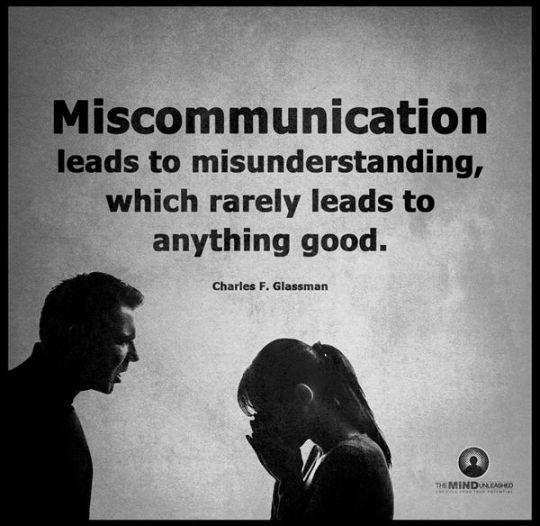
Communication forms the cornerstone of any successful relationship, serving as the lifeline that fosters understanding, trust, and connection between individuals. However, when communication breaks down, it can give rise to misunderstandings, conflicts, and emotional distance. In this blog post, we explore the profound impact of a lack of communication in relationships quote through a collection of poignant quotes. Let's delve into the depths of human connection and the silent echoes of unspoken words.
1: The Echoes of Unspoken Words
"Silence is the most powerful scream." – Anonymous
"Sometimes, the most powerful thing you can say is nothing at all." – Unknown
"The silence between us is deafening, drowning out the words we never said." – Unknown
"In the absence of words, our hearts speak volumes." – Unknown
"We were two parallel lines, destined never to meet because we never learned how to bridge the silence between us." – Unknown
2: The Weight of Unresolved Emotions
"Unspoken words hang heavy in the air, weighing down our hearts with the burden of what could have been." – Unknown
"We suffocate in the silence of our unspoken truths, drowning in the depths of our unshed tears." – Unknown
"The words we never said echo louder than the ones we did, reverberating through the hollow spaces of our broken promises." – Unknown
"Our silence speaks volumes, revealing the depths of our pain and the emptiness of our hearts." – Unknown
"We built walls with our silence, imprisoning ourselves in the fortress of our unspoken fears." – Unknown
3: The Longing for Connection
"In the absence of communication, we drift further apart, longing for the intimacy of shared words and shared hearts." – Unknown
"Our souls ache for the connection that only words can bring, yet we remain silent, prisoners of our own insecurities." – Unknown
"We yearn to bridge the silence between us, to reach across the chasm of our unspoken desires and find solace in the warmth of shared understanding." – Unknown
"The space between us grows wider with each unspoken word, until we are but strangers lost in the silence of our own making." – Unknown
"We search for meaning in the silence, hoping to find echoes of love amidst the echoes of our unspoken truths." – Unknown
Conclusion:
In the tapestry of human relationships, communication forms the threads that weave together hearts and souls. Yet, when communication falters, it leaves behind a void filled with unspoken words and unresolved emotions. As we reflect on these lack of communication quotes, may we be reminded of the importance of open, honest dialogue in nurturing the bonds that connect us. Let us break the silence, bridge the gaps, and rediscover the beauty of shared words and shared hearts in the tapestry of our relationships. If know more about relationship problems,visit our website- LYFSMILE.COM
1.girls love failure quotes
2.Friendship Counseling
3.stress therapy
#relationship#relationships#quotes on relationship#relationship quotes#cute relationship quotes#communication#quotes for relationship#live in relationship#relationship cute quotes#communication skills#relationship trust quotes#quotes#relationship advice for women#quotes about reltionships#communication tips#relationship coach#relationship tips#relationship facts#relationship advice
0 notes
Text
Talk it Out Before You Freak Out: Clear Communication for Better Understanding
The beginning of wisdom is a definition of terms. -Socrates
Empowering Tip: Ask clarifying questions whenever you encounter unfamiliar terms or have doubts about the meaning being used in the conversation. This proactive approach can help avoid misunderstandings and ensure everyone is on the same page, fostering clearer communication.
#communicationtips #activelistening #misunderstandings #effectivecommunication #askquestions #socrates #Nimixo#motivationalquotes #MotivationBlowByBlow #motivationwednesday
#communication tips#active listening#misunderstandings#effective communication#ask questions#socrates#motivating quotes#motivation
0 notes
Text
Turn Annoyance into Opportunity: Master the Art of Persuasion from Everyday Cold Calls!
Have you ever found yourself frustrated at the sound of a cold caller on the other end of the line? What if, instead of seeing this as an annoyance, you view it as an unexpected learning opportunity? Cold callers, the unsung maestros of persuasion, hold valuable lessons in the art of selling.
What if next time:
Instead of rejecting the call or blocking the phone number, you try talking to this…
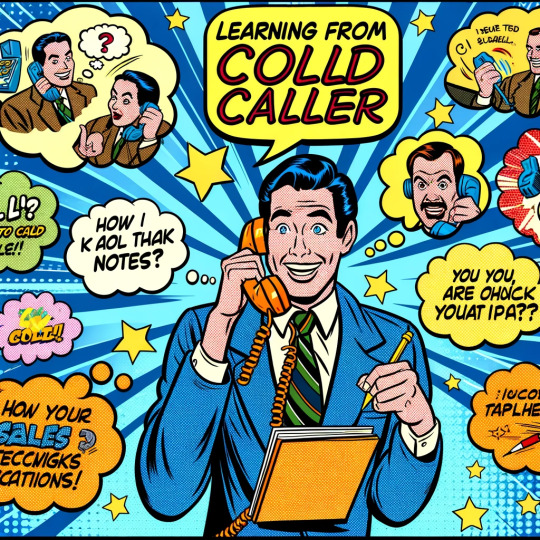
View On WordPress
#cold calling#communication tips#customer engagement#learning opportunities#marketing strategies#personal development#persuasion skills#professional growth#sales pitch analysis#sales techniques
0 notes
Text
Helpful Tips on how procurement can ensure stakeholder BUY-IN?
What is the best way for procurement to communicate its value proposition to stakeholders?
30
youtube
View On WordPress
#Communication Tips#selling procurement&039;s value#social intelligence#stakeholder compliance#Youtube
0 notes
Text
Things That May Be Causing Your Writer's Block- and How to Beat Them
I don't like the term 'Writer's Block' - not because it isn't real, but because the term is so vague that it's useless. Hundreds of issues all get lumped together under this one umbrella, making writer's block seem like this all-powerful boogeyman that's impossible to beat. Worse yet, it leaves people giving and receiving advice that is completely ineffective because people often don't realize they're talking about entirely different issues.
In my experience, the key to beating writer's block is figuring out what the block even is, so I put together a list of Actual Reasons why you may be struggling to write:
(note that any case of writer's block is usually a mix of two or more)
Perfectionism (most common)
What it looks like:
You write one sentence and spend the next hour googling "synonyms for ___"
Write. Erase. Write. Rewrite. Erase.
Should I even start writing this scene when I haven't figured out this one specific detail yet?
I hate everything I write
Cringing while writing
My first draft must be perfect, or else I'm a terrible writer
Things that can help:
Give yourself permission to suck
Keep in mind that nothing you write is going to be perfect, especially your first draft
Think of writing your first/early drafts not as writing, but sketching out a loose foundation to build upon later
People write multiple drafts for a reason: write now, edit later
Stop googling synonyms and save that for editing
Write with a pen to reduce temptation to erase
Embrace leaving blank spaces in your writing when you can't think of the right word, name, or detail
It's okay if your writing sucks. We all suck at some point. Embrace the growth mindset, and focus on getting words on a page
Lack of inspiration (easiest to fix)
What it looks like:
Head empty, no ideas
What do I even write about???
I don't have a plot, I just have an image
Want to write but no story to write
Things that can help:
Google writing prompts
If writing prompts aren't your thing, instead try thinking about what kind of tropes/genres/story elements you would like to try out
Instead of thinking about the story you would like to write, think about the story you would like to read, and write that
It's okay if you don't have a fully fleshed out story idea. Even if it's just an image or a line of dialogue, it's okay to write that. A story may or may not come out of it, but at least you got the creative juices flowing
Stop writing. Step away from your desk and let yourself naturally get inspired. Go for a walk, read a book, travel, play video games, research history, etc. Don't force ideas, but do open up your mind to them
If you're like me, world-building may come more naturally than plotting. Design the world first and let the story come later
Boredom/Understimulation (lost the flow)
What it looks like:
I know I should be writing but uugggghhhh I just can'tttttt
Writing words feels like pulling teeth
I started writing, but then I got bored/distracted
I enjoy the idea of writing, but the actual process makes me want to throw my laptop out the window
Things that can help:
Introduce stimulation: snacks, beverages, gum, music such as lo-fi, blankets, decorate your writing space, get a clickity-clackity keyboard, etc.
Add variety: write in a new location, try a new idea/different story for a day or so, switch up how you write (pen and paper vs. computer) or try voice recording or speech-to-text
Gamify writing: create an arbitrary challenge, such as trying to see how many words you can write in a set time and try to beat your high score
Find a writing buddy or join a writer's group
Give yourself a reward for every writing milestone, even if it's just writing a paragraph
Ask yourself whether this project you're working on is something you really want to be doing, and be honest with your answer
Intimidation/Procrastination (often related to perfectionism, but not always)
What it looks like:
I was feeling really motivated to write, but then I opened my laptop
I don't even know where to start
I love writing, but I can never seem to get started
I'll write tomorrow. I mean next week. Next month? Next month, I swear (doesn't write next month)
Can't find the time or energy
Unreasonable expectations (I should be able to write 10,000 words a day, right????)
Feeling discouraged and wondering why I'm even trying
Things that can help:
Follow the 2 min rule (or the 1 paragraph rule, which works better for me): whenever you sit down to write, tell yourself that you are only going to write for 2 minutes. If you feel like continuing once the 2 mins are up, go for it! Otherwise, stop. Force yourself to start but DO NOT force yourself to continue unless you feel like it. The more often you do this, the easier it will be to get started
Make getting started as easy as possible (i.e. minimize barriers: if getting up to get a notebook is stopping you from getting started, then write in the notes app of your phone)
Commit to a routine that will work for you. Baby steps are important here. Go with something that feels reasonable: every day, every other day, once a week, twice a week, and use cues to help you remember to start. If you chose a set time to write, just make sure that it's a time that feels natural to you- i.e. don't force yourself to writing at 9am every morning if you're not a morning person
Find a friend or a writing buddy you can trust and talk it out or share a piece of work you're proud of. Sometimes we just get a bit bogged down by criticism- either internal or external- and need a few words of encouragement
The Problem's Not You, It's Your Story (or Outline (or Process))
What it looks like:
I have no problems writing other scenes, it's just this scene
I started writing, but now I have no idea where I'm going
I don't think I'm doing this right
What's an outline?
Drowning in documents
This. Doesn't. Make. Sense. How do I get from this plot point to this one?!?!?! (this ColeyDoesThings quote lives in my head rent free cause BOY have I been there)
Things That Can Help:
Go back to the drawing board. Really try to get at the root of why a scene or story isn't working
A part of growing as a writer is learning when to kill your darlings. Sometimes you're trying to force an idea or scene that just doesn't work and you need to let it go
If you don't have an outline, write one
If you have an outline and it isn't working, rewrite it, or look up different ways to structure it
You may be trying to write as a pantser when you're really a plotter or vice versa. Experiment with different writing processes and see what feels most natural
Study story structures, starting with the three act structure. Even if you don't use them, you should know them
Check out Ellen Brock on YouTube. She's a professional novel editor who has a lot of advice on writing strategies for different types of writers
Also check out Savage Books on YouTube (another professional story editor) for advice on story structure and dialogue. Seriously, I cannot recommend this guy enough
Executive Dysfunction, Usually From ADHD/Autism
What it looks like:
Everything in boredom/understimulation
Everything in intimidation/procrastination
You have been diagnosed with and/or have symptoms of ADHD/Autism
Things that can help:
If you haven't already, seek a diagnosis or professional treatment
Hire an ADHD coach or other specialist that can help you work with your brain (I use Shimmer; feel free to DM me for a referral)
Seek out neurodiverse communities for advice and support
Try body doubling! There's lot's of free online body doubling websites out there for you to try. If social anxiety is a barrier, start out with writing streams such as katecavanaughwrites on Twitch
Be aware of any sensory barriers that may be getting in the way of you writing (such as an uncomfortable desk chair, harsh lighting, bad sounds)
And Lastly, Burnout, Depression, or Other Mental Illness
What it looks like:
You have symptoms of burnout or depression
Struggling with all things, not just writing
It's more than a lack of inspiration- the spark is just dead
Things that can help:
Forget writing for now. Focus on healing first.
Seek professional help
If you feel like it, use writing as a way to explore your feelings. It can take the form of journaling, poetry, an abstract reflection of your thoughts, narrative essays, or exploring what you're feeling through your fictional characters. The last two helped me rediscover my love of writing after I thought years of depression had killed it for good. Just don't force yourself to do so, and stop if it takes you to a darker place instead of feeling cathartic
#writing#creative writing#writer problems#writing advice#writing community#writing a book#writing problems#novel writing#on writing#writing tips#writing help#writers on tumblr#writers block#female writers#writers of tumblr#writers blog#adhd writer
17K notes
·
View notes
Text
so rude that fantasizing about writing alone is not enough to actually get the fic done. you have to actually sit down and write it. insane.
#whining about writing instead of actually writing#writeblr#writer#writing#writing memes#writing community#writer’s block#ao3#archive of our own#blorbo#whump#whumpblr#angst#fanfic#fanfiction#writers#writing tips#writing inspo#writing inspiration#whump community#fandoms#fandom#whump blog#trope#tropes#prompt#prompts#writing prompts#whump writing
16K notes
·
View notes